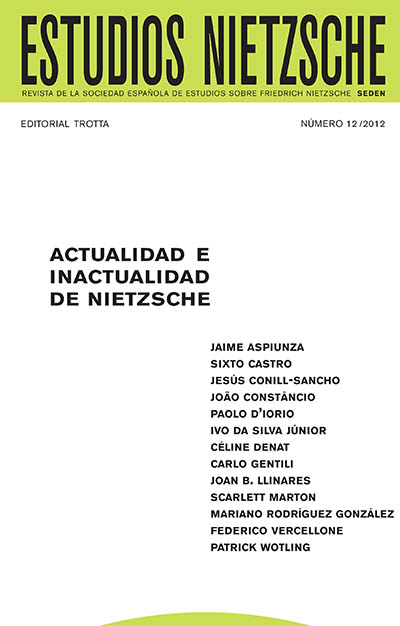What does it mean to think against his time? Untimeliness and Philosophy of the Future in Nietzsche
DOI:
https://doi.org/10.24310/EstudiosNIETen.vi12.10563Keywords:
ultimately, nihilism, free spiritAbstract
The purpose of this paper is to investigate the specific dimension of the untimely man, among the numerous different versions of the philosopher (also portrayed as a free spirit, as a legislator, as a philosopher of the future, as a disciple of Dionysus...). It suggests that Nietzsche takes up again this figure, after a disappearance which spans over ten years, because it proves particularly fit to describe the philosopher’s main task, namely struggling against nihilism by substituting life-enhancing values to the ascetic ones which have reigned over Europe since Plato.
Downloads
Metrics
References
Nietzsche, F., Obras Completas, I-IV (OC ). Director ed. Diego Sánchez Meca. Madrid: Tecnos, 2011-2016
Nietzsche, F., Correspondencia I-VI. (CO). Director ed. Luis E. de Santiago Guervós. Madrid : Trotta, 2005- 2012.
Nietzsche, F., Fragmentos Póstumos I-IV (FP). Director ed. Diego Sánchez Meca. Madrid: Tecnos, 2006-2010.
Downloads
Published
How to Cite
Issue
Section
License
As of issue 21 (2021) this journal is published only in open access (diamond route).
From that number 21, like the previous numbers published in NIETZSCHE STUDIES, they are subject to the Creative Commons Acknowledgment-NoComercia-ShareIgual 4.0 license, the full text of which can be consulted at <http://creativecommons.org/licenses/by-nc-sa/4.0 >
It is the responsibility of the authors to obtain the necessary permissions of the images that are subject to copyright.
This work is licensed under a Creative Commons Attribution-NonCommercial-ShareAlike 4.0 International License.
Copyright generates two different rights: moral rights and patrimonial rights that EJFB recognizes and respects. Moral rights are those relating to the recognition of the authorship. They are rights of a personal nature that are perpetual, inalienable, unseizable and imprescriptible as consequence of the indivisible union of the author and his/her work.
Patrimonial rights are those that can be derived from the reproduction, distribution, adaptation or communication of the work, among others.







11.png)
